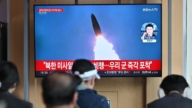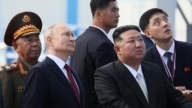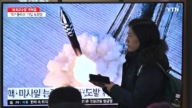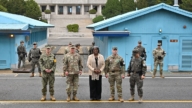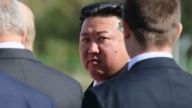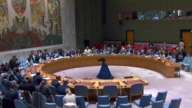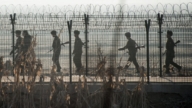【新唐人2013年05月09日讯】7号,中国银行发表声明说,已向“朝鲜外贸银行”发出关闭账户通知,并停止接受该账户的资金转账业务。外界解读认为,大陆当局出于国际压力而对朝鲜做出制裁姿态。但因为中朝之间千丝万缕的关系,双方还是会继续互相利用,中共对朝政策很难有大的改变。下面请看报导。
今年2月12号,朝鲜不顾联合国决议和国际社会反对,进行了第三次核试验。之后,朝鲜更威胁将对外发动战争。这让朝鲜半岛局势快速升温、紧张异常。
3月7号,联合国安理会一致通过第2094号决议,决定加强对朝鲜的制裁力度,尤其是在金融领域和嫌疑货物检查方面。当时,一向力挺朝鲜独裁政权的中共投了赞成票。
随后,美国宣布对“朝鲜外贸银行”进行制裁,禁止美国机构或个人与该行进行任何交易。原因是“朝鲜外贸银行”向朝鲜的核武器和弹道导弹项目提供资金支持。4月,日本也作出相应制裁。
目前,正值美国劝说欧盟制裁“朝鲜外贸银行”的时刻,中国银行罕见的高调宣布参与制裁,这引来外界的关注。
香港城市大学政治学教授郑宇硕分析,朝鲜频频利用核武器及导弹来威胁国际社会,让中共备受国际压力,同时中共对朝鲜的影响力也受到质疑,因此中共此举一方面是表达对朝鲜的不满,另一方面也是为了做样子给国际社会、给美国看。
香港城市大学政治学教授郑宇硕:“国内一般人对北京对朝鲜的政策表示失望。北京这么多年支持朝鲜,结果对朝鲜一点影响力都没有,北京主导的六方会谈现在也差不多破产了。”
北京时政观察人士华颇也指出,从账面上有目共睹,中国大陆是朝鲜最大的经济援助国。
北京时政观察人士华颇:“这个也是表面文章。因为它关闭的账号都是些公开的账号。美国等国际社会基本都知道。既然中国在联合国已经举了手了,所以你还让这些账号正常的运行,显然说不过去。”
香港《经济日报》报导,2009年6月,时任中共总书记的胡锦涛主持召开中央外事工作领导小组会议,重新检讨对朝政策。最后经过激烈辩论,得出的结论为6个字:“不战、不乱、无核”。
中共新任领导人习近平上台后,曾对朝鲜提出批评,因此外界开始猜测:是否习近平、李克强会改变对朝政策?
对此,华颇指出,虽然习、李并不是亲朝派,对朝鲜并无好感,甚至怀疑朝鲜曾深深涉入“薄熙来案”,但华颇认为:中共不会因此抛弃朝鲜。
华颇:“尤其这次朝鲜第三次核试验,虽然中国也是表面举手同意制裁,但是有一点,朝鲜第三次核试验,从某种意义上讲是帮助了中国(中共)。”
华颇分析,中共在南海争端等问题上受制于美国,但又不敢撕破脸面。因此朝鲜对美国的挑战正是中共所乐见,这样中共就有了和美国讨价还价的本钱。
4月22号,中共军队总参谋长房峰辉在与美军参谋长联席会议主席邓普西会面后表示,朝鲜有可能进行第四次核试验。
华颇:“会谈的时候就威胁美国说:朝鲜可能还有第四次核试验,中国愿意帮忙去做朝鲜的工作等等。但是话里话外有一句,中国不会白帮美国的忙。”
华颇强调,中、朝关系很微妙,双方有矛盾、也有合作,但不管怎样,中共不会抛弃朝鲜。对朝鲜的制裁,只是中共所做的表面文章。
采访/易如 编辑/李谦 后制/萧宇
Are China’s Sanctions on North Korea Superficial?
On May 7, Bank of China declared that it will close the
bank accounts of Foreign Trade Bank of North Korea.
It will disable its fund transferals.
Political analysts say that under international pressure,
the Chinese Communist Party(CCP) authorities
have to ostensibly impose sanctions against N. Korea.
The two sides still maintain a complicated relationship,
and will continue to take advantage of each other.
The analysts believe that the CCP’s North Korea
policy won’t see big changes in the near future.
In February this year, North Korea conducted
it’s third nuclear test amidst international outcry.
Afterwards, Pyongyang threatened
to spark off a war externally.
This has intensified the situation on the Korean Peninsula.
On March 7, the UN Security Council
unanimously adopted resolution 2094.
It strengthens N. Korea sanctions, especially financial
transactions and inspecting suspicious cargoes.
The CCP authorities, a long-term ally of
Pyongyang, voted in favor of the sanction.
Later, the US announced sanctions against
the Foreign Trade Bank of North Korea.
It stopped business transactions with the bank.
The bank has reportedly financed Pyongyang’s
nuclear weapons and ballistic missile programs.
In April, Japan passed sanctions against N. Korea.
The US is now persuading the
EU to join the ranks of sanctions.
Bank of China’s high-profile participation
has attracted world attention.
Joseph Yu-shek Cheng, professor of politics
at City University of Hong Kong, commented.
North Korea has repeatedly used nuclear weapons
and missiles to threaten the international community.
This has brought international pressure to the CCP.
Meanwhile, the CCP’s influence on
Pyongyang has come under question.
Prof. Cheng says that the CCP’s action
shows discontentment towards Pyongyang.
In addition, it shows that it just plays to
pressure from the international community.
Joseph Yu-shek Cheng:"Beijing’s policy toward
N. Korea has let down the general public in China.
The Beijing regime has backed Pyongyang
all these years, but has little influence with it.
By now, Beijing-led six-party talks have nearly failed."
Political observer Hua Po says that public financial data
shows China is North Korea’s largest source of financial aid.
Hua Po:"This is also a superficial act.
The bank accounts it closed are all
those that had been exposed to public.
Since the CCP has voted for the UN sanction, it cannot
justify permitting the operation of these bank accounts."
Hong Kong Economic Times reported about a
central leaders meeting that took place in June 2009.
The then CCP leader Hu Jintao reviewed N. Korea policies.
After heated debates, the policy was
finalized as “No war, No chaos, No nuclear".
The CCP new leader Xi Jinping has criticized Pyongyang.
This has sparked speculations on whether Xi-Li
would change the CCP’s policy on N. Korea.
Hua Po interprets that Xi-Li are not pro-Pyongyang.
They even have suspected that N. Korea
was deeply involved in Bo Xilai’s case.
Yet, this won’t make the CCP abandon N. Korea, he says.
Hua Po: “On the surface, China voted for the
sanction against N. Korea’s third nuclear test.
But this test, in a sense, has helped China’s authorities."
Hua Po explains that on some issues, such as South
China Sea disputes, the CCP has been subject to the US.
However, the CCP dares not to offend the US openly.
Pyongyang’s provocations against the
US is what the CCP would like to see.
It gives the CCP a bargaining power
against the U.S., says Hua Po.
On April 22, Fang Fenghui, Chief of the General Staff of
the People’s Liberation Army, met with Martin Dempsey.
who is Chairman of the US Joint Chiefs of Staff.
Fang said that N. Korea is likely
to conduct a fourth nuclear test.
Hua Po:"In the talks, he threatened the US
that N. Korea may initiate a fourth nuclear test.
It was suggested China is willing
to persuade N. Korea to give it up.
He actually implied that China won’t do
this favor for the US without a purpose."
Hua Po says that Beijing-Pyongyang
relationship is very subtle.
Both sides have conflicts as well as cooperation,
so the CCP won’t really abandon N. Korea.
According to Hua Po, the CCP’s sanction
on N. Korea is only a surface formality.


